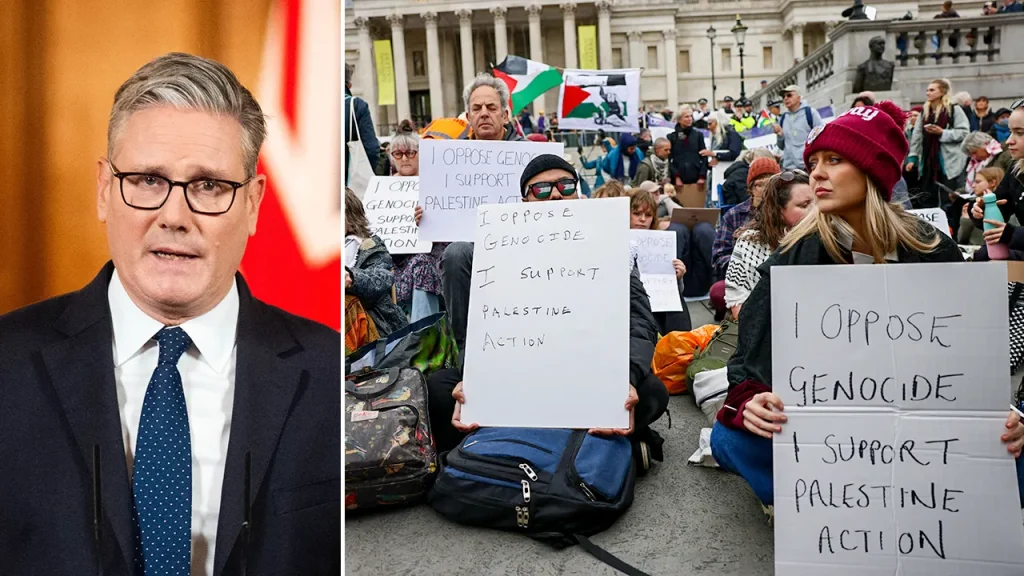UK Anti-Israel Protest Proceeds Despite Pleas Following Synagogue Attack
In a moment of heightened tension and grief, the United Kingdom found itself at a crossroads between freedom of expression and respect for communal trauma. Anti-Israel protesters in London defiantly proceeded with their demonstration on Saturday, disregarding urgent pleas from government officials and police to postpone the event in light of a deadly synagogue attack that had occurred just days earlier. The attack, which took place during Yom Kippur observances at Heaton Park Hebrew Congregation Synagogue, claimed the lives of two individuals and left four others injured. Prime Minister Keir Starmer had made a personal appeal in The Jewish Chronicle, writing, “I know that planned protests over the weekend, just a few days before the anniversary of the October 7 attacks, as well as in the shadow of the Manchester attack, will cause distress.” His call for protesters to “respect the grief of British Jews” and recognize that “this is a moment of mourning, not a time to stoke tension and cause further pain” went unheeded.
The London Metropolitan Police had also warned the protest organizers, Defend Our Juries, of potential consequences should they proceed. Commissioner Sir Mark Rowley expressed concern that the demonstration would “draw valuable resources away from the communities of London at a time when they are needed most.” Despite these warnings, demonstrators gathered in Trafalgar Square carrying signs reading, “I oppose genocide. I support Palestine Action.” The Met reported that the scene was “busy” and that officers made several arrests, though many in attendance appeared to be observing rather than actively participating with placards. The protest’s focus was on demanding the lifting of the ban on Palestine Action, a group that the UK Parliament had designated as a terrorist organization in July under the Terrorism Act 2000 due to what they described as “orchestration and enaction of aggressive and intimidatory attacks.”
The timing of the protest was particularly sensitive following Thursday’s tragic attack at the synagogue during Yom Kippur, the holiest day in the Jewish calendar. Jihad Al Shamie, a 35-year-old British citizen born in Syria, had plowed his car into pedestrians and stabbed at least one person before being shot and killed by police. Two men lost their lives in this attack: 66-year-old Melvin Cravitz and 53-year-old Adrian Daulby. In a tragic twist, officials later revealed that one of the victims had been accidentally shot by police as they rushed to stop the attacker. Daulby was among the worshippers who heroically prevented Al Shamie from entering the synagogue, likely saving many more lives.
The families of both victims released heartfelt tributes, painting pictures of men who lived lives of kindness and courage. Cravitz was remembered as someone who “would do anything to help anyone,” a man who was “kind, caring and always wanted to chat and get to know people,” and who was “devoted to his wife, family and loved his food.” Daulby’s family described him as “a hero” who “tragically lost his life in the act of courage to save others,” remembering him as “a beloved brother, loving uncle to his four nieces and one nephew and a cherished cousin” and “a lovely, down-to-earth man.” These personal testimonials underscored the human cost of the attack and the profound loss felt by the victims’ families and the wider community.
The contrast between these personal tragedies and the decision to proceed with the protest prompted Gideon Falter, chief executive of Campaign Against Antisemitism, to voice his frustration. “This is the intifada globalized,” he stated in a video posted to social media. “What did you think it was? ‘Globalize the intifada’ means Jews on the ground in a pool of blood, dead outside a synagogue on the holiest day of the Jewish year.” His pointed criticism extended to British institutions that he felt had failed to protect the Jewish community, asking, “Where are our institutions that are supposed to make sure that this sane, tolerant, decent place remains the Britain that we know and love?” This question encapsulated the feelings of many in the Jewish community who felt increasingly vulnerable amid rising antisemitism and perceived institutional inaction.
The controversy surrounding the protest highlights the complex tensions in British society regarding free expression, communal sensitivity, and the response to international conflicts. Defend Our Juries claims that Palestine Action was unfairly labeled a terror group “for trying to stop crimes against humanity and for exposing the British government’s complicity in genocide.” This framing attempts to position their protest as a defense of justice rather than an act of insensitivity. However, critics argue that the timing of the demonstration—coming so soon after a deadly attack on the Jewish community and just before the anniversary of the October 7 Hamas attacks on Israel—demonstrated a callous disregard for communal grief. The incident raises profound questions about how societies balance competing values of free expression and communal respect, particularly in times of heightened tension and grief, and underscores the challenges faced by law enforcement and government officials in managing these competing interests while maintaining public safety and social cohesion.


